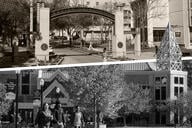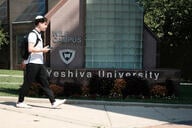You have /5 articles left.
Sign up for a free account or log in.
In advance of the pope's visit to the United States, many speculated on what he would have to say to Catholic college presidents, with some wondering (aloud, in the news media) whether he would issue a stern, doctrinal rebuke about maintaining Catholic character.
Anyone who feared a simple papal scolding Thursday would have been relieved. In an intimate and very intellectual address to about 400 Catholic education leaders at Catholic University of America in Washington, Pope Benedict XVI maintained a positive tone, explicitly thanking educators for their service and “selfless contributions” toward the end of a short but dense speech that explored responses to moral relativism, the connections between faith and reason, the concepts of truth and freedom, and, also, of academic freedom (the latter in a paragraph that is likely to be much-parsed but seems, several college presidents in the audience said, to be consistent with the church’s prior teachings.)
“The Church's primary mission of evangelization, in which educational institutions play a crucial role, is consonant with a nation's fundamental aspiration to develop a society truly worthy of the human person's dignity,” the pope said from a chair made of maple wood and against the backdrop of a wall sheathed in yellow gold.
“At times, however, the value of the Church's contribution to the public forum is questioned. It is important therefore to recall that the truths of faith and of reason never contradict one another. The Church's mission, in fact, involves her in humanity's struggle to arrive at truth. In articulating revealed truth she serves all members of society by purifying reason, ensuring that it remains open to the consideration of ultimate truths. Drawing upon divine wisdom, she sheds light on the foundation of human morality and ethics, and reminds all groups in society that it is not praxis that creates truth but truth that should serve as the basis of praxis.”
“Truth,” he continued a little later in his speech, “means more than knowledge: knowing the truth leads us to discover the good. Truth speaks to the individual in his or her the entirety, inviting us to respond with our whole being.”
Pope Benedict emphasized that an institution’s Catholic identity is not only a matter of numbers of Catholic students but also "a question of conviction…. Are we ready to commit our entire self -- intellect and will, mind and heart -- to God?” He described the “crisis of truth” as rooted in a “crisis of faith,” and stressed the importance of Catholic formation -- a message, some said, relevant both to representatives of K-12 and higher education in the audience.
“While we have sought diligently to engage the intellect of our young, perhaps we have neglected the will. Subsequently we observe, with distress, the notion of freedom being distorted. Freedom is not an opting out. It is an opting in -- a participation in Being itself. Hence authentic freedom can never be attained by turning away from God. Such a choice would ultimately disregard the very truth we need in order to understand ourselves.”
The pope also described an urgency for what he called "intellectual charity," or the recognition "that the profound responsibility to lead the young to truth is nothing less than an act of love."
And, as for academic freedom, Pope Benedict, a former professor, reaffirmed its importance -- but also, in very strong terms, its limitations.
“In regard to faculty members at Catholic colleges and universities, I wish to reaffirm the great value of academic freedom. In virtue of this freedom you are called to search for the truth wherever careful analysis of evidence leads you. Yet it is also the case that any appeal to the principle of academic freedom in order to justify positions that contradict the faith and the teaching of the Church would obstruct or even betray the university's identity and mission; a mission at the heart of the Church's munus docendi and not somehow autonomous or independent of it,” the pope said.
“He did say that academic freedom wasn’t free, but we knew that,” said Patricia McGuire, president of Trinity University, in Washington, D.C. “Absolute freedom isn’t absolute,” she said, adding that there are limitations on academic freedom in every discipline, not only Catholic theology, based on disciplinary norms. “I think he reminded us of how the pope approaches academic freedom, which is not a new teaching.”
Over all, McGuire said, “I think he had a fundamental message of encouragement."
“It was a very deep, a very nuanced vision that he has reiterated,” said the Rev. Robert Presutti, president of the University of Sacramento. “What he was trying to do was nurture the spirit.”
The Rev. Terence Henry, president of Franciscan University of Steubenville, said he was particularly struck by Pope Benedict’s use of the term “conviction” to describe Catholic identity. For the Rev. Jeffrey von Arx, president of Fairfield University, in Connecticut, the phrase that stood out was “intellectual charity” -- “the idea,” Father von Arx said, “that the pursuit of truth has to lead to the pursuit of compassionate love.”




